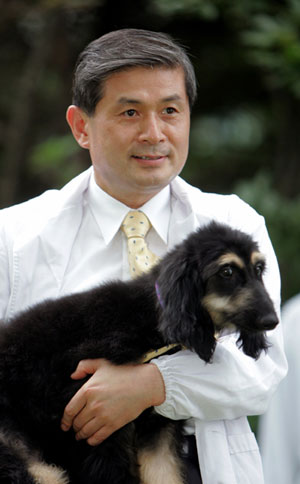South Korean cloning scientist indicted
(AP)
Updated: 2006-05-12 11:51
SEOUL, South Korea -- South Korean prosecutors on Friday indicted disgraced
cloning scientist Hwang Woo-suk for alleged fraud, embezzlement and violation of
bioethics law in a scandal over faked stem cell research.

South Korean scientist
Hwang Woo-suk holds Snuppy, the first male dog cloned from adult cells by
somatic nuclear cell transfer, during a news conference at the Seoul
National University in Seoul in this August 3, 2005 file
photo. [AP] |
Prosecution official Lee In-kyu announced the indictments of Hwang and five
members of his research team during a nationally televised news conference. Lee
said prosecutors had decided not to take them into custody. He did not
elaborate.
Hwang - once hailed as a stem cell pioneer and treated as a
national hero - was fired March from his post as a professor at Seoul National
University's veterinary department after admitting he fabricated data in two
high-profile papers published in academic journals in 2004 and 2005.
His
now-discredited claims of breakthroughs in cloning and stem cells had offered
hope of new treatments for millions of patients suffering from paralysis and
debilitating diseases such as Alzheimer's and Parkinson's.
Hwang was
charged on Friday with fraud for accepting 2 billion won (US$2.1 million;
euro1.7 million) in private donations based on the outcome of the falsified
research, Lee said. Hwang also embezzled about 800 million won (US$856,000;
euro667,000) in private and government research funds, the official said.
Hwang also paid money to receive human eggs for research, a violation of
the country's bioethics law, Lee said.
Prosecutors said Hwang falsified
his research papers, but decided not to charge him for that, because "there has
been no precedent in the world" of bringing criminal charges for fabricating
academic papers.
Hwang was unreachable for comment. The office of
Hwang's attorney Lee Geon-haeng said Lee did not come to his office Friday. A
call to his cell phone was answered by a recording saying it was switched off.
Of the five researchers, one was indicted for obstruction of duty, three
for fraud and one for violation of the bioethics law.
|